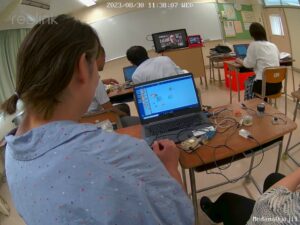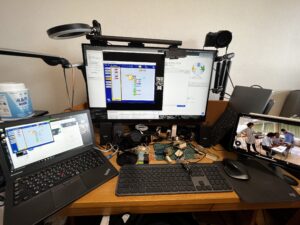In September, a programming class using PICO Cricket will be held in a special needs classroom in Hachioji City. First, we held a trial session for teachers.
During the 90-minute hands-on session, we showed six teachers how to use PICO Cricket and how to program, after having them look at actual works created by their students. We will be discussing how to support the children in the class to be held in late September.
We will be conducting classes remotely, but this time we also held a trial session to test the connection.

If we are face-to-face, we can talk while looking directly at the screen, but in the case of remote, not being able to see the participant’s screen is still a hurdle in supporting the activity. This time, we used a remote camera (a.k.a. “eyeball daddy”), which we had tried in a university class. By setting the camera to high-definition mode, we managed to see the participants’ screens. I would like to think of some tricks, such as having the children decorate the camera so that they can easily ask for help.
Also, this time, the presence of Mr. Okada, with whom we have been working together on research classes for some time, at the site made it possible for the hands-on workshop to proceed smoothly. For remote workshops, it is essential to have someone who is familiar with the equipment used and the workshop itself. Having someone who knows the workshop as a whole allows us to not only respond to minor equipment problems, but also to provide smooth support to participants remotely. It is essential to have someone who knows where to take the “eyeballs” and who can move them around the venue. We would like to discuss how to make the best use of “Meidama Oyaji” with the participants after they learn what kind of activities they can do at the hands-on experience session.
Right now, I am the only “Meodama Oyaji,” but I would like to introduce multiple “Meodama Oyaji” in the future. A remote facilitator to support children’s activities from a distance will be my next challenge. Of course, we would like to provide lots of support to the children as well, but we would also like to consider “little remote facilitators” who can take a little time out of their workshop time to support the children’s activities.
If anyone is interested, please let us know.

